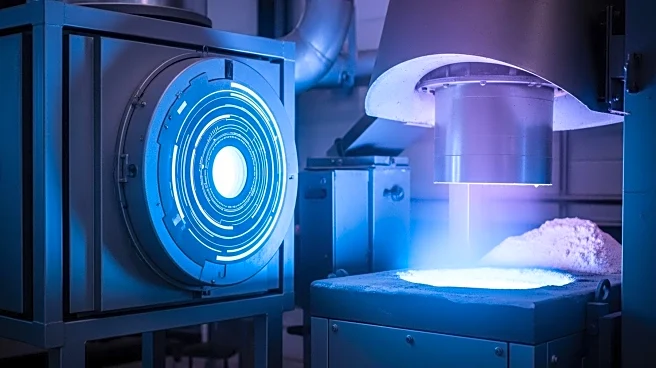What's Happening?
African Rainbow Minerals (ARM), a diversified mining company, has introduced SmeltDirect technology, which significantly reduces electricity consumption in smelting operations by over 70%. This innovation also cuts carbon emissions by about 60% and positions users at the bottom of the cost curve. The technology is ready for commercialization and aims to revitalize South Africa's ferroalloy industry, which has suffered due to high electricity costs. SmeltDirect requires only 1.2 MW of electricity per ton of alloy, compared to the conventional 4 MW, and is expected to create 700 jobs for every 200,000 tons of alloy produced annually. ARM plans to commercialize this technology at its Machadodorp Works facility in Mpumalanga, South Africa.
Why It's Important?
The introduction of SmeltDirect technology is crucial for the South African economy, particularly in the mining sector, which has been struggling with high electricity costs. By reducing energy consumption and carbon emissions, this technology not only makes smelting operations more sustainable but also economically viable. It has the potential to restore South Africa's position as a leading producer of ferroalloys and green steel, thereby boosting job creation and foreign exchange earnings. The global attention SmeltDirect has attracted could lead to increased investment and partnerships, further enhancing the country's industrial capabilities.
What's Next?
ARM is engaging with various partners to commission new plants and commercialize SmeltDirect technology. The company is also exploring solar power options to further reduce energy costs and carbon emissions. ARM plans to buy solar power from independent power producers rather than building its own solar plants, due to uncertainties in legislation and tariff structures. This approach allows ARM to save on electricity costs while gaining clarity on future regulations.
Beyond the Headlines
The development of SmeltDirect technology highlights the importance of innovation in addressing environmental and economic challenges. By reducing electricity consumption and emissions, ARM is contributing to global efforts to combat climate change. The technology also underscores the potential for reindustrialization in South Africa, offering a model for other countries facing similar challenges in the mining sector.









